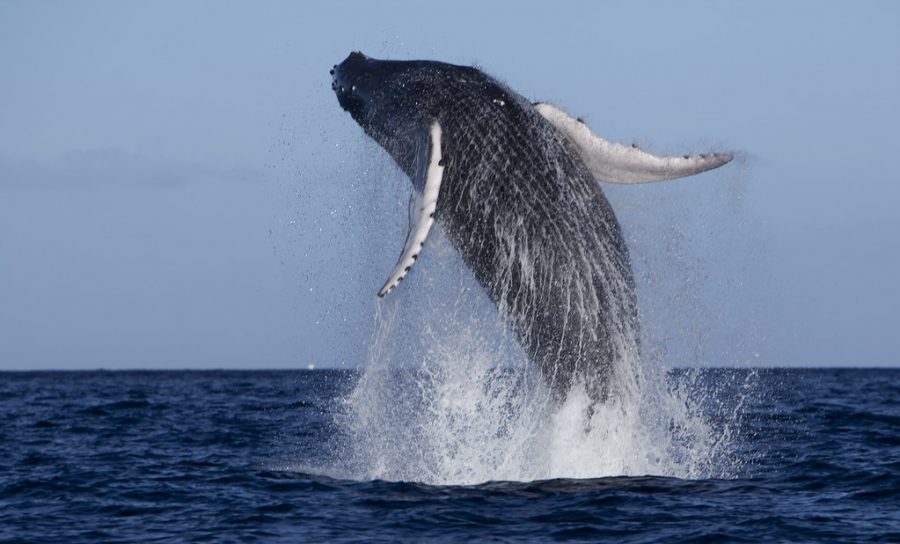Stop Killing Whales For Our Own Good
October 8, 2021
It’s no secret that killing animals is cruel, as all animals were fostered on the planet to thrive. Not only does it disrupt the food chain, but it harms the environment, which only ends up harming us as humans later on. Specifically, I discovered that whales need to be protected. They are a keystone species, and without them roaming our oceans, there would be more carbon dioxide buildup in the environment, and ocean life would decrease.
As of today, “six out of the thirteen great whale species are classified as endangered or vulnerable, even after decades of protection,” expert Leigh Henry said.
Whales have been hunted for thousands of years, beginning with the Norwegians and the Japanese. During the Middle Ages and Renaissance, whaling grew in popularity in Europe, which then later spread to America. Whaling hit its peak in the mid-1800s. As technology became more advanced, it became more and more brutal for the whales to continue thriving. Oceanadventures.co said that in the 1930s, 50,000 whales were killed annually, as they were hunted for their valuable oil. Whaling became a multi-million dollar industry, as commercial whaling also spread. Somewhere along the line in the 1970s, the U.S. government realized that whales had become so over hunted that there were eight whales listed as endangered species. In 1971, whaling was officially outlawed.
After that, whales have begun to make a slow comeback in their numbers. Their populations are slowly increasing today since many whale species only give birth to one calf at a time. Whales today are mostly harmed by accidents, like boats speeding in shallow waters or entanglement in fishing gear. However, not all countries are on board with banning whaling. Countries like Japan, which have a long history of whaling, can’t seem to stop. Although a huge majority of the population has transitioned to eating fish and other forms of meat, the government still supports whale hunting. It seems that they are just killing them for the fun of it, as an average Japanese eats only one ounce of whale meat per year.
Killing whales is unjust, not merely because of the pain it causes to them but also because taking an innocent animal out of its environment for our benefit is ethically wrong. Whale killing should be stopped for many reasons, one of them being that whale falls can’t happen naturally in the ocean. By taking whales out of the ocean, they can’t die naturally. When a whale naturally dies, it begins a whale fall where its body sinks to the seafloor where it provides an abundance of food for all sorts of critters on the seafloor, from the meat itself to the carcass and bones. Whale falls bring a lot of nutrients to creatures on the seafloor, the dangers of whale explosions of gas and intestines onshore, and the fact that whales are involved in an important environmental process called fecal plumes, and taking whales away would impact other organisms in the ocean.
Whales benefit humans, the environment, and organisms. It wouldn’t make sense to take something away from its environment when it causes wonders around the world.
Hunting whales and taking them out of their natural environment doesn’t allow them to naturally decompose and get fed on, and because of this, many organisms starve. Certain types of worms, snails, and bacteria solely rely on whale falls as a source of food. Removing a whale is equivalent to removing an entire ecosystem for certain animals. This negatively impacts all of the other organisms that feed on whale falls, including the fish that we hunt.
Another reason to stop hunting whales is because of their high capacity to hold so much gas, people can get injured or blown back from how much pressure is released when cut open. As a result of hunting whales, these whale explosions can cause intestines to fly out everywhere like sausage links, blood to flow out in rivers, and a loud boom.
Finally, whale fecal plumes are crucial to the ocean. It might sound weird to say, but their poop is vital! Whale fecal plumes excrete tons of dense nutrients like nitrogen and phosphorus from the depths of the ocean to the surfaces where microorganisms like zooplankton and phytoplankton thrive.
It would make sense for fisheries to think that by fishing whales, they’re helping their fish population grow since the fish would have fewer predators. However, it works the opposite way. Without whales in the ecosystem, bringing nutrients from the depths of the ocean to the surface to initiate growth and productivity, fish wouldn’t be able to get very far. Contrary to what most people might think, having more whales in the ocean actually helps increase the survival of fish and help increase their numbers.
“Our new review points to several studies that show you have more fish in an ecosystem by having these [whales] there,” a biologist with National Geographic, Joe Ronan, said.
This is because whales basically fertilize the waters of their ocean, bringing their poop with them wherever they go. All sorts of marine plants can live because of fecal plumes that help them in their photosynthesis, which helps reduce the amount of carbon dioxide in the atmosphere by tons. Therefore, whales are beneficial to us because they have actually been helping alleviate climate change for centuries.
“Each great whale sequesters 33 tons of CO2 on average. . . compare that to a tree, which absorbs only up to 48 pounds of CO2 a year,” said Ralph Chami, Thomas Cosimano, Connel Fullenkamp, and Sena Oztosun.
All in all, we as humans need to protect whales, especially because their numbers are declining today. Whales are crucial because they provide an abundance of food for organisms when they naturally die, are dangerous when hunted, and help slow climate change by helping new organisms thrive in once-unsustainable habitats.
Photo Courtesy of Scott Moore

